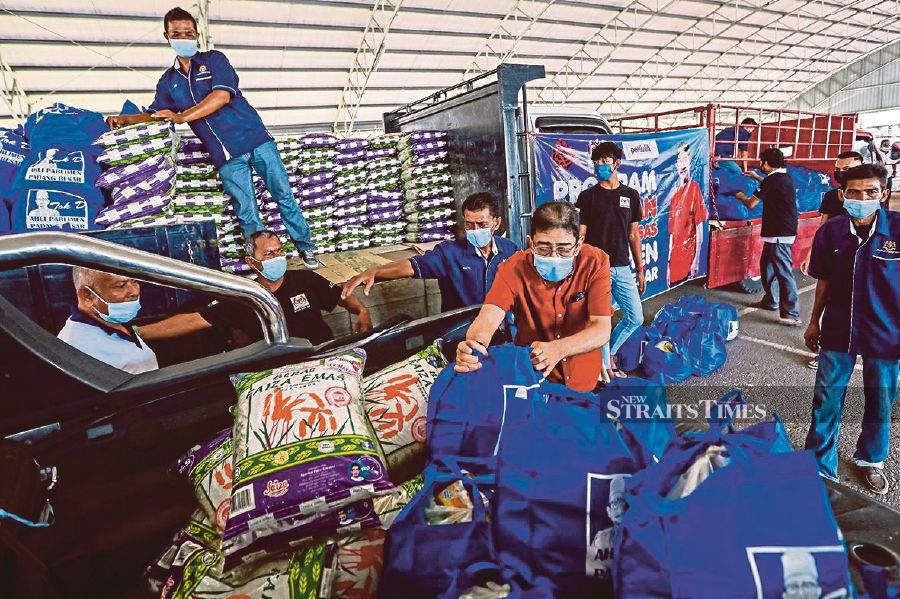CASH handouts are an important part of stimulus packages to alleviate insecurity of essential needs brought about by the economic effects of lockdowns.
The government has dug deep into its resources to provide financial aid to many who are saddled with critical food insecurity and other needs.
Aid is disbursed to eligible individuals by direct credit to bank accounts. However, the effectiveness of this measure has diminished because of a surge in cases in the last three months, though the number has gone down in recent days.
Thus, many, particularly low-income earners, want additional cash aid to support basic needs, especially food.
It would be instructive for us to look at the the Benefits Transfer under the United States' Supplemental Nutrition Assistance Programme (SNAP).
Originally conceived as the Food Stamp Programme in 1939, SNAP was instituted to alleviate hunger and malnutrition by providing low-income households with financial resources to purchase nutritious food.
The Joe Biden administration recently announced a 25 per cent increase in food stamp benefits, the largest jump in the programme's history.
The programme had transitioned from paper-based food stamps to food coupons. Recently, it issued electronic benefits transfer (EBT) cards to eligible recipients.
It has become an aid delivery mechanism that enables food purchases at approved stores with restrictions placed on tobacco, alcoholic beverages and non-food items, such as cosmetics, to ensure funds are properly spent.
EBT cards went nationwide in the US in 2002. EBT also contributed to reducing costs associated with two key aspects.
The first is administering SNAP. Second, it expedites the reimbursement to retailers and had the capability of including other aid programmes, like the Temporary Assistance to Needy Families, and Women, Infants and Children.
SNAP has built-in mechanisms to direct financial aid for essential items by imposing restrictions and ensures spending at approved stores to obtain further "legitimate" spend.
EBT also provides an added layer of control to curb fraud, for instance through counterfeit stamps.
There are lessons here that maybe applied to Malaysia. We suggest several key areas below for better clarity.
FIRST, restricting items that can be bought will target spending to essential food items, which in turn maximises the purpose and intent of financial aids
SECOND, appointing authorised retailers for aid recipients to purchase essential items. This adds a second layer of security as to the proper use of the aid.
It also allows programme administrators to ensure strict adherence to fair pricing principles; extract discounts that benefit aid recipients given the business volume directed to authorised retailers; ensure essential items meet nutrition requirements at cost-effective prices; prevent use of financial aid for non-essential items; and direct authorised retailers to acquire essential items from certain producers.
These are prerequisites for driving the broader recovery.
THIRD, introducing an electronic delivery mechanism can tighten control to ensure proper spending and ease administrative burden. This capability can be built into bank cards or into the MyKad.
LASTLY, the electronic delivery system allows for data capture, collection and analysis to improve the financial aid programme for greater relevance to targeted recipients and achieving intended objectives.
Analysis of this data can also be used in conjunction with other aid schemes to increase impact.
In this respect, the RM300,000 Food Basket Aid allocated to members of parliament can be made more relevant if aid recipients' spending patterns were known. This is valuable for recipients to access a broader range of products.
The execution of this proposal may seem complicated. But, the potential of targeting specific sectors to meet the financial aid programme's overarching objectives and contribution in supporting selected economic sectors warrants consideration as it enhances controls over the spending of aid recipients.
The proposed mechanism will also advance our socio-economic wellbeing.
Ng Wai Heng is a certified public accountant and former managing partner, global business services, IBM Malaysia. Lau Sim Yee is a professor at Reitaku University, Tokyo, and has been teaching Southeast Asia studies, international economics, integration, development economics and Asian economy since 1983





